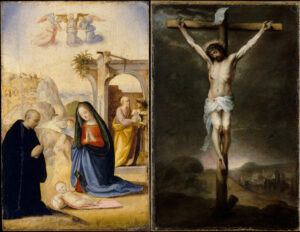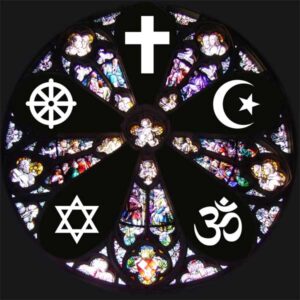By Dr. Don Bierle, FaithSearch President
What is the biblical bridge between the two great celebrations of the Christian faith – Christmas and Easter? It is two names!
Two thousand years ago, God sent the angel Gabriel to earth to deliver a message with two names: “The virgin will be with child and will give birth to a Son, and they will call Him Emmanuel…”; “And she will bear a Son; and you shall call His name Jesus” (Matthew 1:21, 23). Why two names? What is their significance?
Eight out of ten people in the world believe in god or a higher power. Why? Because God made certain that everyone in the world could know THAT He exists by leaving His fingerprints of Intelligent Design in nature. The apostle Paul makes that explicit: “…what may be known of God is plain to them… for since the creation of the world God’s invisible qualities – His eternal power and divine nature – have been clearly seen… so that they are without excuse” (Romans 1:18-20).
But WHO is it? The Bible says, “No one has ever seen God…” (John 1:18).
The Problem of “Knowableness”
People around the world are confused about God’s identity. They make up names (Allah, Brahman, Krishna, Hu, Sai Baba) for a god they know must be there based on the evidence of the creation. But what is God like? Hinduism says that he (Brahman) is abstract, a being “without attributes or qualities” (no love, holiness, justice, etc.) because he is not a person, and is invisible, intangible, and elusive. Islam says he (Allah) is distant, “above the limitation of metaphor,” (i.e. can’t be described as a “good shepherd”) because he is so far beyond us that he can’t be described in human terms.
As a result, the world’s people have accepted that “god,” who they know must exist because they see His invisible qualities in His creation, is nonetheless abstract, distant, and not knowable.
Other Religions’ Response to God
According to Romans 1:18-25 there is a three-step progression of people’s response to God.
- AWARENESS of God’s Existence (1:18-20 – quoted above)
- SUPPRESSION of the Truth about God (1:21-22)
For even though they knew God, they did not honor Him as God, or give thanks; but they became futile in their speculations, and their foolish heart was darkened. Professing to be wise, they became fools.
This suppression is illustrated, for example, by the publication of the Humanist Manifesto which states, “We are convinced that the time has passed for theism.” [Their conclusion: There is no God and the origin of people is a cosmic accident.] - REPLACEMENT of the Truth about God (1:23-25)
Not able to solve the difficulty of the knowableness of God but desiring to fill the spiritual void which it leaves, humans invented their own “gods.” They
…exchanged the glory of the incorruptible God for an image in the form of corruptible man and of birds and four-footed animals and crawling creatures… For they exchanged the truth of God for a lie and worshiped and served the creature rather than the Creator, who is blessed forever. Amen.
In Hindu mythology the impersonal Brahman emanated into personal “gods” (like Vishnu) who in turn emanated into avatars (e.g. animals: fish, tortoise, boar; persons: Krishna, Rama). Finally, these avatars emanated into an estimated 330 million personal “creatures,” or “heavenly beings,” like monkeys, cows, or elephants, who are worshiped rather than the Creator. It is impossible to relate to their ultimate impersonal reality, Brahman, so they invented personal “creatures” they can relate to. They can touch the cow!

The Christian Response to God
God’s identity is knowable in fact and in history, not in mythology or in legends: “The virgin will be with child and will give birth to a Son, and they will call Him Emmanuel – which means, ‘God with us’” (Matthew 1:23). This is the significance of Christmas – when the God of creation became a man in history (John 1:14). The creation tells us THAT God exists, history tells us WHO it is! “No one has ever seen God, but God the One and Only, who is at the Father’s side, has made Him known” (John 1:18). For Christians, this removed the problem of the knowableness of God. We know WHO it is because of Christmas.
The Christian Responsibility to the World
Before Jesus returned to heaven, He told His followers, “…you will receive power when the Holy Spirit comes upon you. And you will be my witnesses, telling people about me everywhere – in Jerusalem, throughout Judea, in Samaria, and to the ends of the earth” (Acts 1:8).
Jesus said that every Christian is to be committed to evangelism and world missions. We have the responsibility to tell all the floundering religions and non-religious people in the world that God has revealed Himself – so they, too, can know WHO God is. His name is Emmanuel. That’s the significance of the first name announced by the angel Gabriel, and that’s the “Good News” of Christmas – I can know WHO God is! (Luke 2:10).
What’s In A Name, part 2, will be in the next issue of the Paraclete.



